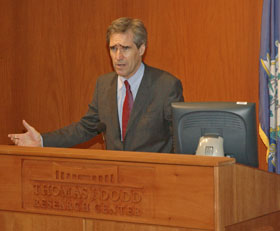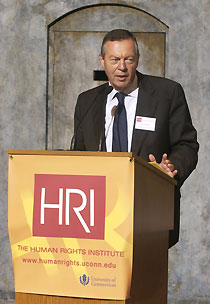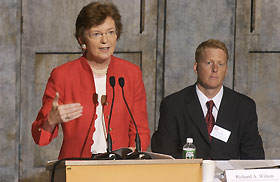For more archives, go to the Advance Archive/Search Page.
Conference Explores Human Rights
And Terrorism After 9/11
If human rights advocates want to have an impact on public policy, they must balance principles with pragmatism, according to Michael Ignatieff, director of the Carr Center for Human Rights Policy at the John F. Kennedy School of Government at Harvard University.
 |
Michael Ignatieff of Harvard University gave this year's Sackler Human Rights Lecture, the opening event of a conference on human rights.
|
Ignatieff was speaking during the Ninth Annual Sackler Lecture on Human Rights, the opening event of a conference titled "Human Rights in an Age of Terrorism" that took place September 9-11. The conference, the inaugural conference of the University's new Human Rights Institute, examined the implications for human rights observance of the new political order that has emerged since the terrorist attacks of September 11, 2001.
Ignatieff, who was introduced by Richard Wilson, director of the Human Rights Institute, called for a "balancing approach" to human rights, to resolve the contradiction between absolute principles and pressing security concerns.
"If you're on the front line . fighting to defend standards that are under attack, then you fight for them without qualification," he said. "But if you're a human rights thinker whose concern is to have public policy impact and speak to people who have to make balancing decisions, then you have to speak the language of choice."
Defining terrorism as "the deliberate targeting of non-combatants by non-state actors for political purposes," Ignatieff said terrorism is often used in support of human rights. Much of the terrorism that has taken place in the past century - in areas such as Palestine, Chechnya, Northern Ireland, and South Africa - has been in pursuit of human rights goals, such as the right to self-determination, he said.
"The horror of terrorism," he added, "is it evacuates the political space that would give us alternatives to violence."
As an example of tough political choices that weigh human rights against security, Ignatieff pointed to the targeting of immigrants after 9/11.
"In a situation of radical uncertainty, when you can't evaluate how bad the situation might be, it is legitimate as an emergency measure to pull in a lot of people," he said. "The mistake was that after that, we denied a large category of people due process."
He said pre-emptive military action in Iraq was another tough choice, arguing that the war was the only way Iraq would ever "have any chance of a democratic regime" after the very real horrors of Saddam Hussein's rule.
Human rights protection, Ignatieff said, "involves balancing choices, and very painful attempts to use lesser evils to achieve greater goods."
Other speakers during the conference explored the impact of September 11 and the U.S. response.
 |
Aryeh Neier, president of the Open Society Institute, speaks at the conference
on Human Rights. |
Aryeh Neier, president of the Open Society Institute, said the willingness of the United States to use force to impose democracy and human rights has aroused great antagonism in the Middle East and other parts of the world.
It has also damaged the human rights cause, he said.
"What has happened since September 11, 2001 is that the image of the U.S. worldwide is now the image of a human rights violator rather than the image of a respecter of human rights," he said. "Everywhere in the world, people know about Guantanamo, and it has become a symbol of American policy.
"Increasingly, the administration has relied on the argument that it went into Iraq to promote human rights - that is, to remove a tyrant who oppressed his people," Neier said.
But the U.S. is seen as hypocritical in its advocacy of human rights, he said, because of the way those who were suspected of terrorism were treated at Guantanamo and the way the war with Iraq has been conducted. That gives the human rights cause a bad name, he added.
"The very terms 'democracy' and 'human rights' seem to be associated in many parts of the world with American willingness to impose its will by its superior force and to act in a way which seems to disregard all international conventions in the process," Neier said.
Nadine Strossen, president of the American Civil Liberties Union (ACLU), said the Patriot Act and other laws passed after September 11, 2001 undermine civil liberties and are ineffective in boosting national security.
Strossen said that the first post-September 11 ACLU report captured the unfolding situation. "It was called 'Insatiable Appetite: The Government's Demand for New and Unnecessary Powers After September 11,'" she said.
Section 505 of the Patriot Act, for example, dramatically expands the government's power to require various record holders, including banks, libraries, and Internet service providers, to turn over confidential information without having to go before a court, by alleging that the information is sought in connection with an anti-terrorism or counter-intelligence investigation. "The record holder must turn over the information and must not tell us that it has done so," she said.
Strossen was critical of Congress for passing the Patriot Act. She said most members have admitted that they didn't read the Act.
She also chided Attorney General John Ashcroft for insinuating that civil libertarian critics of the Act were unpatriotic or even traitors.
And she discussed a lawsuit the ACLU has brought to challenge what she termed the government's unjustified overreaching since September 11.
Despite the challenges, Strossen said, there is cause for optimism, as most of the administration's subsequent efforts to expand the Patriot Act have been effectively resisted in Congress, with resistance on both sides of the aisle and in both houses.
 |
Mary Robinson, left, the former United Nations High Commissioner for Human Rights,
speaks at the conference. At right is Richard Wilson, the director of the Human Rights
Institute. |
Mary Robinson, former United Nations High Commissioner for Human Rights, challenged the notion that a "war on terror" is the antidote to insecurity.
"The terrible attacks of 9/11 fell in my view within the definition ... of crimes against humanity, which would have been a more effective rubric under which to organize and sustain an effective response," Robinson said. "The language of being at war with terrorism has had direct and nefarious implications. . Order and security have become priorities that trump all other concerns.
"To combat terrorism," she said, "it is necessary to probe more deeply and tackle the root causes of humiliation, anger, and frustration which can be manipulated to draw recruits for terrorist action."
Robinson said many people in the world are "preoccupied with different experiences of insecurity - the atrocities in Darfur, Sudan; the misery of the millions living with, and orphaned by, HIV and AIDS in sub-Saharan Africa, Asia, and elsewhere; the long hardship suffered by indigenous peoples in the Americas; the humiliating poverty in slums and rural areas in the developing world. They all tell us a deplorable truth: that governments in different regions of the world are failing to provide even the rudiments of human security."
A new approach is needed, she said, "which begins with a broader understanding of what defines human and global security. We must craft a policy that manages and balances our increasing interdependence with our increased vulnerability."

